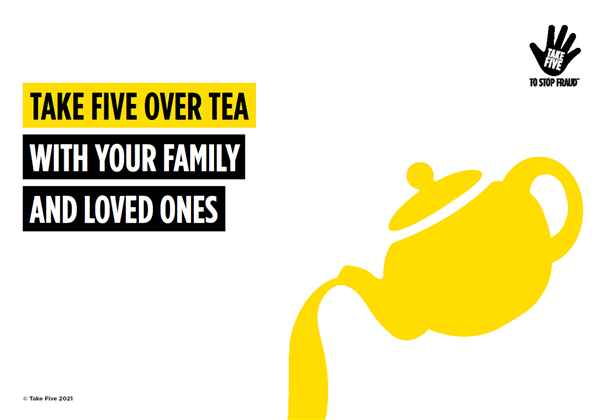|
The aim of Take Five over Tea is to encourage families to sit down with parents/grandparents and anyone else they think may be vulnerable to financial fraud, whether in their own home, on the phone or online, and then discuss the advice provided.
Fraud and Scams have a devastating impact on all those who fall for them, and this is a summarised format of the Take Five toolkit to help families set up their own discussions.
WHY THIS IS IMPORTANT FOR YOU AND YOUR FAMILY
We all think we are savvy when it comes to fraud and scams, but the truth is any one of us can fall for one, especially in the heat of the moment. Criminals are increasingly becoming more sophisticated, using many tactics to gain our trust and make it harder for us to spot the obvious signs of a scam as easily.
By taking the time to talk to your loved ones, including those who are not online, they have a much better chance of spotting a scam, and more importantly, preventing themselves from falling for one.
TYPES OF FRAUD AND SCAMS
As technology becomes more sophisticated, so do the techniques used by criminals. They now use a wide variety of methods to trick people, the most frequent are listed below:
IMPERSONATION SCAMS
Criminals are experts at impersonating trusted organisations, including banks, the police, and government departments such as HMRC and DVLC, to convince you to make a payment or share your personal and financial detail.
INVESTMENT SCAMS
There are numerous paid adverts or comparison sites claiming to be legitimate firms offering guaranteed returns with minimal risk. You may be asked to complete a “Contact Form” with your personal details for a Call-Back.
The use of genuine company logos, celebrity endorsements and testimonials may often be fake.
PURCHASE SCAMS
It can be easy to fall for a purchase scam. Criminals advertise goods/services at “too good to be true” prices often via social media or auction sites to trick people into purchasing something that does not exist. They often use images taken from genuine sellers to convince you they are the real deal. They may also ask for payment prior to delivery and send fake receipts and invoices that seem to be from the payment provider.
ROMANCE SCAMS
The ease of online dating services often means you can find the love of your life in the comfort of your own home. However, this also provides criminals with an opportunity to gain your trust and build a relationship with you by using information and fake identities found on social media – also known as catfishing. Criminals will claim to declare strong feelings for you just after a few conversations before pretending to need money for a personal emergency or flights to visit you.
COURIER FRAUD
If you’re contacted by someone purporting to be from your bank or the police, take a moment to question their authenticity. If the caller is from the bank, they may claim that their system has spotted a fraudulent payment on your card or that it is due to expire and needs to be replaced. They may even confirm personal details about you, such as your full name and address and offer you peace of mind by having someone such as a courier collect your card to save you from having to go to your bank or local police station. You may even be asked to write down your PIN and place it in a separate envelope to that of your card.
DOORSTEP SCAMS
Doorstep criminals can come in all sorts of disguises, from dodgy salesmen to unscrupulous tradespeople and, can be very convincing. They may claim to have noticed something about your property that needs work or improvement, such as the roof, and offer to fix it for an inflated price with payment required upfront. Some criminals may even convince you to visit your bank branch to withdraw money whilst they set up their equipment
HOW TO PROTECT YOURSELF AGAINST FRAUD AND SCAMS
If you receive a request to provide personal or financial information whether that’s over the phone, in an email, online or through social media always remember:
• Criminals are experts at impersonating people, organisations and the police. They spend hours researching you for their scams, hoping you’ll let your guard down for just a moment.
• Stop and think – It could protect you and your money.
SOURCE: TAKE FIVE:
For fuller details, please see the PDF leaflet attached.
——————————————————————————————
Please feel free to share this information with any family, friends, or neighbours that you think it may be able to assist.
———————————————————————————–
Take Five to Stop Fraud
STOP: Taking a moment to stop and think before parting with your money or information could keep you safe.
CHALLENGE: Could it be fake? It’s OK to reject, refuse or ignore any requests. Only criminals will try to rush or panic you.
PROTECT: Contact your bank immediately if you think you’ve fallen for a scam and report it to Action Fraud
ALWAYS REMEMBER:
• Avoid disclosing security details
• Emails, Phone Calls and Texts may not be authentic
• Always make direct contact with any organisation by using a genuine phone number
• Stop and Challenge any unexpected requests
• Protect others by reporting Fraud and Scams
—————————————————————————————————–
If you’ve fallen for a scam,
report it to Action Fraud on 0300 123 2040 or via actionfraud.police.uk
Scam Text messages can be forwarded to 7726 to help phone providers take early action and block numbers that generate spam on their networks.
Forward Fake Emails received to report@phishing.gov.uk
If you think your bank account or personal banking details have been used fraudulently, then use the short phone number – 159 – to contact the Fraud Prevention Department of most major UK banks.
|

